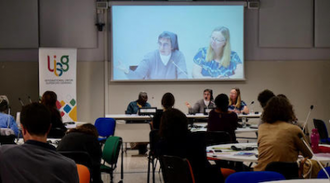Faith-based investors listen to 'the cry of the Earth and cry of the Poor'

We need different models of finance and investing that are rooted in the priorities of marginal communities, according to a conference in Rome on Monday. An extraordinary gathering of Catholic investors and congregations gathered in Rome on 6 November for a roundtable on how to ensure our investment decisions are rooted in the experiences of those most affected by them.
The roundtable, entitled 'Anchoring Faith-Consistent Investing in the Experience of Frontline Communities', was co-hosted by FaithInvest with UISG, the International Union Superiors General, and Catholic Impact Investing Collaborative, and held in collaboration with the Laudato SI' Action Platform and the Laudato Si' Movement. Around 40 people were in the room and the event was streamed live on YouTube to 268 people.
We heard some very powerful testimonies from the Global South, particularly around the impact of extractive industries, such as fossil fuels and mining, on local communities. Lindlyn Moma, Director of Advocacy for the Laudato Si' Movement, said capital expenditures for oil and gas exploration in Africa rose from £3.4 billion in 2020 to $5.1 billion in 2022. However, the history of oil exploration in Africa has been marked by tragedy. Nigeria's Ogoniland region suffered nearly half a century of oil spillage since Shell started drilling in 1958. More than two million barrels of oil have polluted Ogoniland, with devastating impacts on local communities: 'People have stopped farming because the soil is polluted, and children have to gather water from rivers layered with crude oil,' she said. Shell denies liability.
Disturbing testimonies were followed by inspiring examples of how faith-based organisations are using their investments for positive impact. It became clear that use of finance and investments - for good or ill, whether as a driver of environmental destruction or as a tool to protect and enhance life on earth - is a key concern of the Catholic Church.
Dr Lorna Gold, FaithInvest CEO, said Catholic Social Teaching, particularly the teachings of Pope Francis in Evangelii Gaudium, Laudato SI' and Fratelli Tutti, calls us to look critically at our global financial system through the eyes of those most affected. "How are we to respond to the cry of the earth and the cry of the poor?" she asked.
This is certainly an issue that the Dicastery for Promoting Integral Human Development is looking at. The Dicastery Secretary Sr Alessandra Smerilli said it was developing pastoral guidance on these topics for the local church. "Pope Francis has asked the Dicastery to be at his service, and we know his vision, and also at the service of the local churches," she said; "We are in a journey to establish a relationship of authentic listening and dialogue with the local church."
She added: "As we listen, it becomes more and more clear that we need different models of finance and investing that are rooted in the priorities of marginal communities and build their shared capacity for self-determination and co-creation of a flourishing future. This means that we must clarify the real purpose of finance and then develop structures that better enable us to work together for the common good. How can we foster this shift? Start by listening and lived experience. The local church and local communities can provide wisdom and insights to find ways address barriers and create new possibilities. So, listen, listen and listen, as Pope Francis tells us."
Three key takeaways from the event:
Start by listening: Sr Alessandra Smerilli's words were echoed by Bryan Pini, President and Chief Investment Officer of Mercy Investment Services.
"You approach the world through the lens you know," he said. "Centring our conversations in communities affected by extractive industries really caused participants to have a different understanding. This is probably the single most important thing we can do as Catholic organisations - invite people into conversations, make sure we have at the table the communities most affected by the decisions we make."
The power of coming together: Tommy Piemonte, head of Sustainable Investment Research for Bank fur Kirche und Caritas eG, told us what happened when the bank mobilised a coalition of nearly 100 Catholic organisations to raise the issue of the Amazon among Brazilian politicians, decision-makers and the public. "This was the first time that a Catholic investor alliance of this magnitude carried out engagement together," he said. "We achieved a lot of dialogue at the highest levels, were able to raise our concerns about the destruction of the Amazon and of indigenous communities over 100 times in the media and also raised awareness in the international Catholic investing community. We brought a new perspective in the conversations."
Become visible: There is lots of great work being done by faith-based organisations but no one talks about it, no one sees the great reports, said Tommy Piemonte. We have to be more visible to show what a faith-first approach looks like.
LINKS
Faithinvest: www.faithinvest.org
International Union Superiors General: www.uisg.org
CatholicImpact: www.catholicimpact.org
Susie Weldon is Director of Communications for FaithInvest.


















